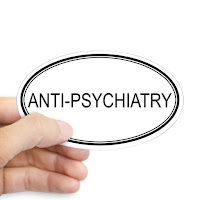It was reading Madness and Civilization [by Michel Foucault mentioned in my last post] that did most to persuade me that the history of mental illness and its place in the modern world was a serious intellectual subject, worthy of sustained attentionDespite this, Scull continues to say that Foucault’s argument has “remarkably little to do with the world of contemporary scholarship”. I hesitate to question such an eminent historical scholar of psychiatry, although I do think he was also hard on Susan Lamb’s book on Adolf Meyer (see previous post). On the other hand, I gave him 4 stars (out of 4) in a BMJ review for his book on Henry Cotton. I would also very much recommend Masters of Bedlam, of which he is the first author.
I have come to accept John Iliopoulos’ view that Foucault was neither for or against the Enlightenment (see eg. previous post), whereas Scull thinks Foucault was “fundamentally a foe of the Enlightenment”. I'm less clear what Scull means by saying that he himself is "fundamentally one of its [the Enlightenment's] disciples and defenders", even though he says psychiatry is "deserving of critical attention". I certainly don't think that Foucault dismisses "the whole enterprise [of psychiatry] tout court", as Scull seems to suggest. It's almost as though Scull seems to think that Foucault denies the reality of madness, which is nonsense, surely. Either that, or I don't understand what Scull means when he says, "Foucault seems to me [ie. him, Scull] to ignore or misrepresent the disruptions and the suffering madness brings in its train". Even Thomas Szasz denied this sort of accusation, whereas it is easier to understand how it may be levelled at Szsaz than Foucault.
In the History of Madness, Foucault talks about the 'liberation' brought about by Pinel and Tuke compared to the Great Confinement 150 years earlier (p. 106). Because the word 'liberation' is in quotation marks, in what sense are we to take it that Foucault did not really mean the reforms of Pinel and Tuke were liberating? Scull seems to take this as Foucault dismissing Pinel and Tuke, which I do not think is the case. I want to look in a little more detail at these two examples of Pinel and Tuke in the origins of psychiatry and add a third, Francis Willis.
1. Phillippe Pinel
In Paradise Square in Sheffield, there is a plaque commemorating the translation of Philippe Pinel’s seminal work A treatise on insanity by Dr D.D. Davis in 1806 (see my book chapter). The original was published in french a few years earlier. Pinel was clear that psychiatry focused on "lesions of the functions of understanding". Pinel’s approach was called "traitement moral", which was translated as moral treatment, meaning psychological, in the sense of ‘through the emotions’, not 'moralising' as such, treatment. He viewed case histories of asylum inmates with understanding and respectful kindness, although he was still determined to break any resistance of patients.
Jean Baptiste Pussin, the director of the Bicêtre, a public hospice for men near Paris, where Pinel worked as "physician of the infirmaries", first replaced iron shackles with straightjackets in 1797. Pinel followed Pussin’s example 3 years later at the Salpêtrière, the public hospice for women, where he then served as physician-in-chief. Pussin used repressive measures but claimed he controlled patients without mistreatment. The idea of Pinel as the liberator of the insane has become fixed in two well-known paintings, entitled "Pinel orders the chains removed from the insane at Bicêtre" by Charles Muller, dated 1849, and "Pinel frees the madwomen at the Salpêtrière" by Tony Robert-Fleury, painted as late as 1878.
Pinel was sceptical about the aetiological importance of brain changes in mental illness. His psychosocial perspective could be seen as the basis for his humanitarian intent. The theoretical model of mental illness held by professionals can have implications for their ethical practice. However, this does not mean that psychiatrists with different theoretical orientations cannot treat patients ethically and with kindness. For example, Vincenzio Chiaguri (1759-1826), although having a somaticist, different understanding of mental illness from Pinel, expected patients to be treated with respect. He outlawed chains as a means of restraint, even before Pinel, in 1793, at Santa Dorotea, the hospital he directed before moving to the Bonifazio in Florence.
There has always been a tension between custodial and therapeutic practice in psychiatry and this is clearly demonstrated in this example of Pinel and Pussin. Any liberation that Pinel brought about for the mentally ill was still subject to restrictive practices. Isn't this at least part of what Foucault meant?
2. The Retreat in York
The Retreat in York was opened by the Quaker and layman, William Tuke, in 1796. His grandson, Samuel Tuke, wrote a Description of the Retreat (1813). The Retreat was a country house, with no bars on the windows, where, as quoted by Samuel Tuke and Foucault, the "air ... is healthy, and much more free from smoke than situations near manufacturing towns". It was famed for its humane treatment of patients, using "reason and kindness". Like Pinel and Pussin, this does not mean there were no restrictive practices.
In the chapter on 'The birth of the asylum' in History of madness, Foucault points out how the Quakers had long had dealings with houses of confinement and surmises they had been particularly vigilant about care and assistance to the insane. In some ways, madness was more a disease of society than the person themselves. Interestingly, Foucault points out that Tuke preferred the French term 'mental alienation' to the English word 'insane'. Reason and truth coincide in health, but disorder can occur when reason and truth are alienated from each other, even though thinking capacity is maintained. As Foucault says, "At the Retreat, the human group was brought back to its original, purest form. ... [M]adness became alienation, and its cure was the return to the inalienable". Even though "the talk was all of moral experience, philosophical themes and dream-like images", madness was reduced to unreason. Alienation was interiorised and installed in confinement.
Although Tuke was seen as liberating the mad, Foucault says it was in fact something quite different. As Foucault says,
The Retreat was to act as an instrument of segregation: moral and religious segregation, which sought to rebuild around madness an atmosphere that resembled a Quaker community as closely as possible. ... [R]eligion was the concrete form of that which cannot be alienated.As he goes on,
[C]onfinement imposed fear on madness from without. ... Fear at the Retreat was a much deeper affair. ... [F]ear now was granted the power of disalienation, restoring a sort of primitive complicity between the mad and the men of reasonFoucault gives an example from Samuel Tuke of a maniacal man, of whom even his guards were afraid, who arrived at the Retreat handcuffed and in chains. His fetters were removed and he was allowed to eat with the superintendents and he calmed immediately. The superintendent explained he would never be restrained unless he broke the rules of the house or went against the general principles of human morality. Although these kind of threats were still required at times over following days, the patient managed to restrain himself and was discharged after 4 months entirely cured.
Nonetheless there were still plenty of restraints still in use at the Retreat. But this was coupled with a self-restraint under the gaze of others, thus helping to master madness. Surely Foucault was merely describing the "gigantic moral imprisonment" of Tuke's regime, not necessarily dismissing his reforms.
3. Francis Willis
As another example, Francis Willis become celebrated for curing and mastering King George III's madness in 1789. The king was not excused standard treatments of the time from Willis, such as restraint in a straightjacket and blistering of the skin. But Willis also allowed the king to read King Lear and to shave himself with an ordinary razor (British Medical Journal, 1914, 1:213-4). Such gentler methods and greater liberty seemed to have gained the confidence of the king. A traditional anecdote is that, when asked what he would have done if the king had become violent with the razor, Willis replied that he would have controlled him with his gaze. The regime at his asylum involved manual work in the stables and fields of the estate. These patient labourers were dressed in coats, waistcoats, breeches, stockings and powdered wigs.
The ethical environment of the practice of Pinel, Tuke and Willis may not be that much different from today, despite the development of community care. Psychiatry manages madness on behalf of society, and it therefore has a tendency to exaggerate its authority for control. How to manage risk is not just a modern, central concern. Justifications are still made for custodial practice, including the need for sedation and seclusion, even if the straightjacket is no longer in regular use in developed services. There has always been a tension between restraint and freedom in psychiatric practice. There may be good intentions but practice easily slips into paternalism. Was Foucault really saying any more than this?
Final comment
As John Iliopoulos says, Foucault was not "engaged in an anti-psychiatric endeavour using counter-Enlightenment discourse" (see previous post). Scull and others seem to have been taken in by this point of view. Foucault accepted the validity of the anthropological project of the late eighteenth century with its descriptive diagnostic approach to madness. Where psychiatry went wrong was its positivist reduction of mental illness to brain disease in mid-nineteenth century. I couldn't agree more (eg. see previous post).
It worries me that Scull, in a defence of his views about Foucault, does not mention Colin Gordon's criticism of his views (see another previous post). Certainly I was put off reading Foucault until recently because of the cursory caricature of his work, including from Scull. I think we all need to read History of madness more closely.













